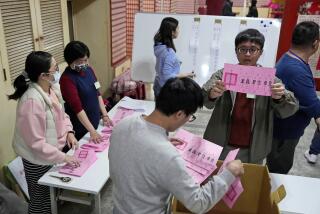Internet Censorship in Asia
- Share via
Countries that feel it’s in their best interests to censor the Internet may find that in the process they are crippling their national growth in many ways, especially in the highly competitive area of international trade (“Cyber-Censorship Grows in East Asia” by Joshua Gordon, Commentary, Sept. 27).
Today, there is no worldwide source of information except the Internet that can keep pace with the geometric progression of change. Yes, there is much “chaff” on the Internet. But, at the same time, it’s the source of, among other things, hundreds of thousands of pages of scientific research and data. Censorship suggests two things. First, one’s position is so weak that it cannot stand up to a free flow of information and ideas. Second, that people are mentally incapable of separating the “wheat from the chaff.”
In today’s competitive infor- mation-based society it’s not those who end up with the “most toys” who will win, but those with access to the latest information.
RON WHITTAKER
Simi Valley
Gordon accused the Singapore government of trying “to censor opposing political views.”
As an example, he said that when Williams College conferred an honorary degree on Prime Minister Goh Chok Tong last year, and a controversy broke out, the Singapore media slanted its reports of critics, including “dissident Singaporean politicians, American academics and columnist William Safire.”
Far from suppressing these contrary views, the Singapore government and media gave them the widest publicity. The media reprinted in full articles by Safire and George Crane, a Williams College professor. The prime minister invited Safire to come to Singapore to debate against him, with full media coverage, both local and international. Safire declined.
Subsequently, Parliament debated the issue. The government produced a full transcript of what Francis Seow, a former opposition politician and a fugitive from justice, had said at Williams College. It invited opposition members of Parliament to state if they agreed with Seow, but they repudiated Seow’s wild statements. All this was fully reported.
Singaporeans therefore did not need the Internet to learn “the salient details of this debate.”
CHAN HENG CHEE
Singapore Ambassador
to Washington
More to Read
Sign up for Essential California
The most important California stories and recommendations in your inbox every morning.
You may occasionally receive promotional content from the Los Angeles Times.













